The inside story of what it took to create the Charlotte Latino Film Festival
For Giovanna Torres and her husband Alexander Piñeres, building the Charlotte Latino Film Festival has taken them on a journey around the world to create something that feels like home.
Their work over the better part of a decade will culminate with the festival’s debut when 11 new films from nine countries are shown from April 4-14 at The Independent Picture House in NoDa. The lineup also includes a documentary set in the North Carolina rodeo circuit, “Bulls and Saints.”
Their efforts began in 2016 with a blog by Torres called Cine Casual, dedicated to Latin American film. It grew into a film series with the same name starting in 2020, and is now taking a big leap forward as an inaugural film festival.
Piñeres, a 35-year-old native of Colombia, and Torres, 32 and originally from Puerto Rico, recently spoke with The Charlotte Observer about what it took to bring the festival to life, and their plans for its future.
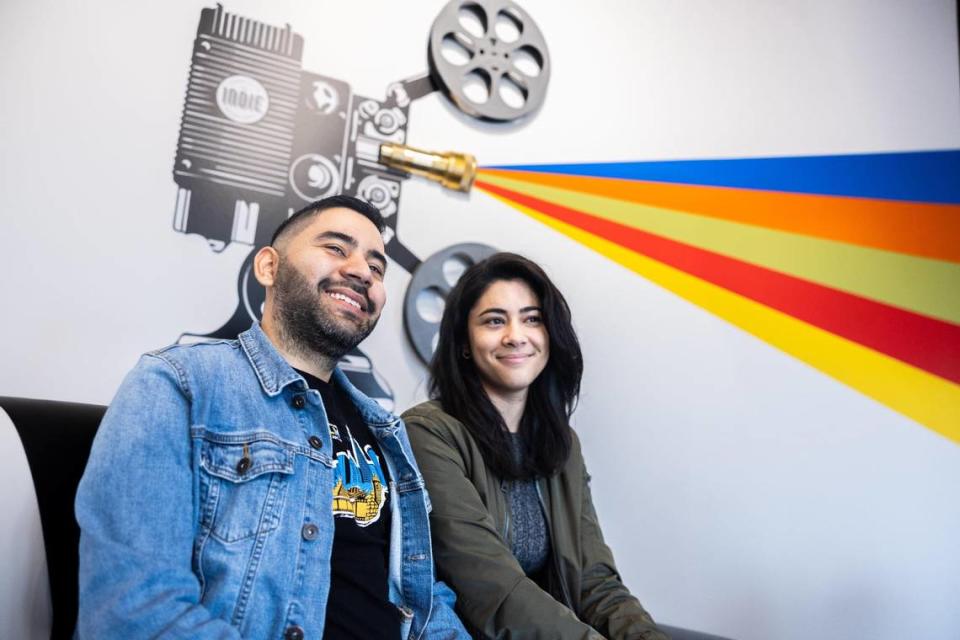
Meeting and discovering Latin American films
The couple met as students at the University of Connecticut during Torres’ freshman year in the 2009-10 school year. At the time, she also was taking a class on Latin American history through film and felt transported.
“It just opened my world,” Torres said. “I was like, where was this? ...I had gone I don’t know how many times to the movie theater with my parents in Puerto Rico and I never saw this…
“For me, at least, watching those films here in the U.S. is also a way of staying connected to the culture, you know, staying connected to home, to the family,” she said. “Just being able to watch something in Spanish or Portuguese or in an Indigenous language and being able to see those stories that are usually not told.”
Torres also spent a lot of time working a front desk job at UConn’s Latin American Cultural Center, where she found comfort and community, living away from home for the first time. That’s where she first met Piñeres, who is a couple years older.
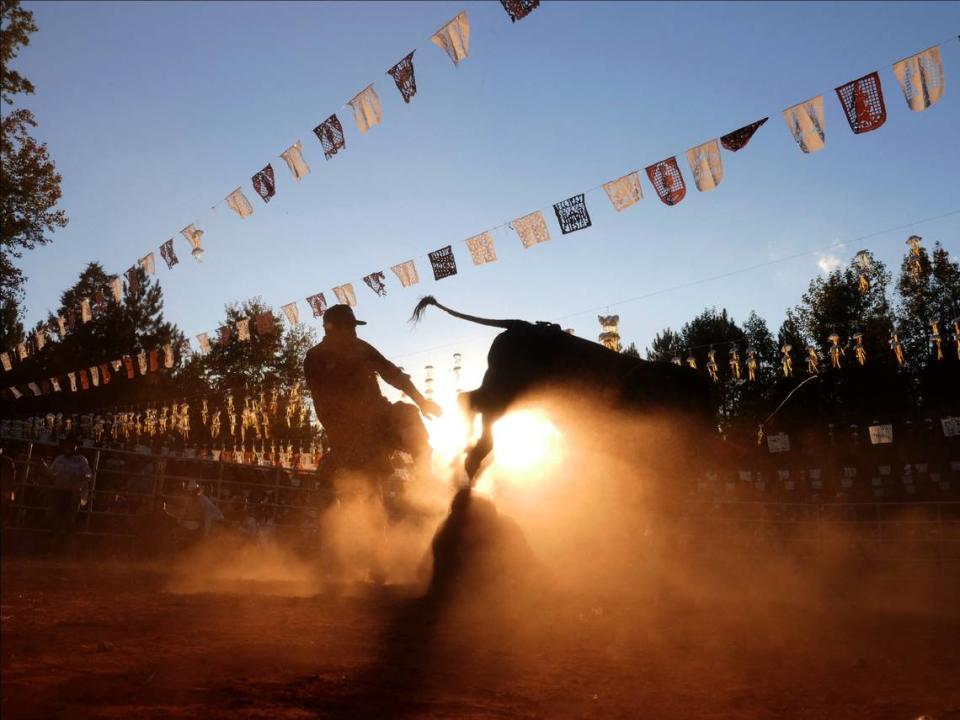
He shared an interest in Spanish language films, which he had first discovered as a teen at his local library in Connecticut, when his family arrived from Colombia about 20 years ago when he was 15.
That intro piqued his interest and he continued exploring film in college.
Going to see movies also became part of their social routine with friends. They would catch a new Penelope Cruz film or see an Argentine flick and it was easy to do.
“Maybe we took it a little bit for granted when we were in Connecticut,” Piñeres said. “...It wasn’t like ‘oh, this is our thing,’ it was just: we were movie goers.”
But when they moved to Charlotte in 2015 for a job opportunity in advertising for Torres, they couldn’t find those films here.
That gave Torres the idea for the blog: a resource for people like them who enjoyed Latin American films and wanted to know more about the latest releases. She left her job to launch the blog in early 2016.
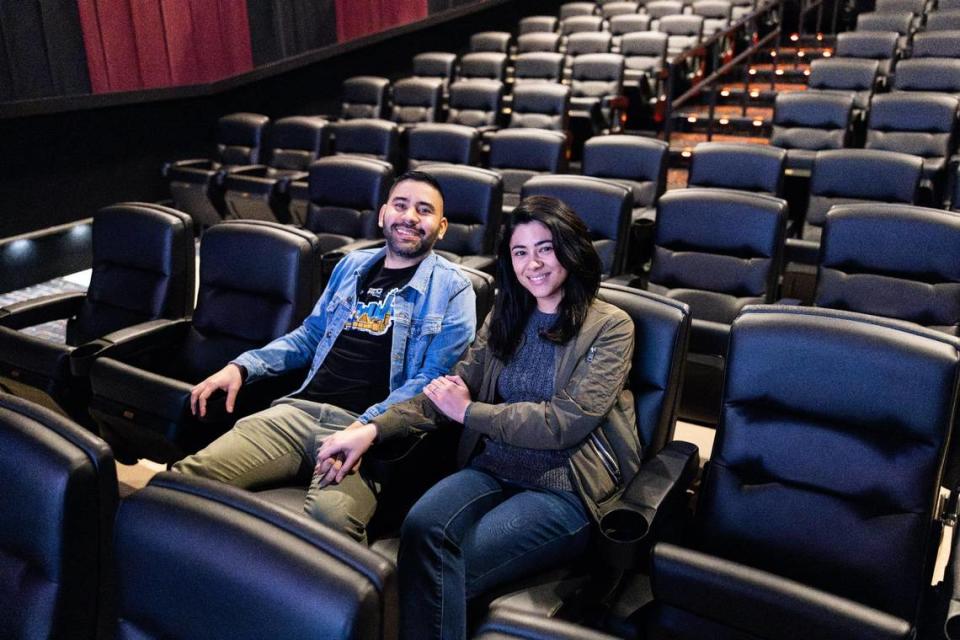
Challenges and opportunities
By late 2016, Torres was back in a full-time job in marketing and communications for the Arts & Science Council, and running the blog on the side. It was quickly developing a following not only locally but across Latin America.
To develop content, the couple started using their vacation days to travel to film festivals around the world, including the Cartagena International Film Festival in Colombia, the Panama International Film Festival, the Chicago Latino Film Festival, and events in Miami, San Francisco and other cities.
They interviewed filmmakers and actors, and wrote about the latest industry news. Traveling to such far-away places was a leap of faith, since they were funding everything on their own.
“I remember talking to my mom on the phone and I was like, ‘Well, we’re going to use all this PTO to travel here and cover this film festival,’ ” Torres said. “And I didn’t really even understand why we were doing it. Like, why were we spending all this money, spending time, resources to cover a film festival just to have something on the blog?
“But now, fast forward six, seven years and looking back at it, we were meant to be at those film festivals. We had to make all those connections then, so that we could be where we are now.”
Through those festivals, they started meeting filmmakers and distributors, and building relationships with them. They also saw the ins and outs of organizing a festival.
That kind of education was invaluable since they were new to it all. They have been able to take those lessons and adapt them to Charlotte’s market.

Organizers at big, well-established festivals explained how to organize screenings and bring visiting filmmakers in. Some lessons were applicable right away. Others, like bringing in big-name directors, could lie further down the road.
And some things didn’t apply because Charlotte’s Latino population, while growing rapidly, isn’t as big as, say, Miami’s. So they learned they’d have to approach things in a way that made sense for Charlotte.
They also saw that some festivals have teams of 10 or more people to do all that their team of two takes on. That means they try to be very strategic in their efforts.
It all goes toward the goal of launching the film festival and ensuring it is a sustainable event. “We don’t want to skip steps because we want this to be here for years to come,” Torres said.
Seeking an audience
In 2019, the couple got their first big grant — a $14,000 Celebrate Charlotte Arts award from the Knight Foundation toward developing a film series.
“We could have just gone crazy our first year when we got that money,” Torres said. But they opted for a slower, more intentional approach to build something “successful and sustainable.”
They wanted to see if there was an audience in Charlotte for these kinds of films. So they started small, with an initial screening in January 2020 at Camp North End.
Films scheduled for later that year were cut short by the pandemic, but the couple was able to bring back the Cine Casual series in 2022 and 2023 with steady growth in content and audience.
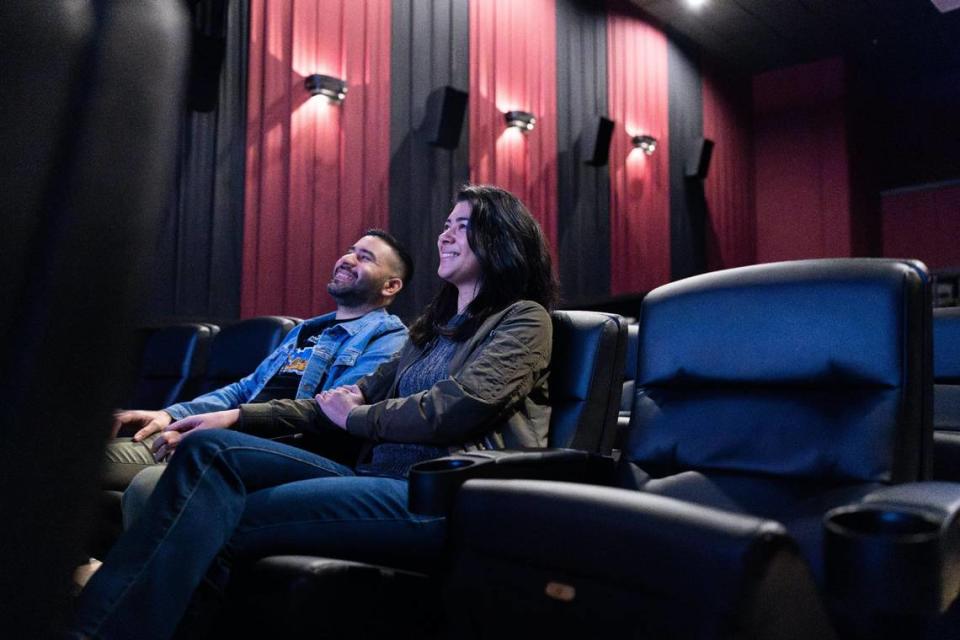
About the Charlotte Latino Film Festival
The films at the fest are not currently available on streaming platforms in the U.S. and come from some of the best Latino filmmakers today, Piñeres said. Many have received awards and accolades at major international festivals.
The couple co-curated the festival together.
Several special events are also planned around the films, which come from a range of countries, including Mexico, Peru and Puerto Rico.
As executive director of Cine Casual, Torres now works full time on day-to-day operations, which include the blog, a monthly newsletter and several social media outlets in addition to overseeing the festival.
Piñeres balances his time with a full time job as director of programs for Levine Museum of the New South. He helps write for the blog, and takes a leading role as emcee for audience Q & As, interviews and panel discussions following screenings.
It’s easy working together, Piñeres said, because their skills are complementary. “That definitely helps a lot.”
‘We built this together’
Since part of their mission is to build community through the screenings, the couple intentionally partners with local Latino businesses and creators as part of the experience.
That includes companies like Manolo’s Latin Bakery and Peruvian photographer Ernesto Moreno, who have been involved with the series for multiple years. That effort gets people excited and invested in the effort to bring these films and create a community collectively.
“It hasn’t been Alex and Giovanna’s project,” Moreno said. “We built this together.”
The festival is being funded by the city of Charlotte and the Foundation for the Carolina’s Infusion Fund, and the North Carolina Arts Council.
Creating a welcoming place for everyone to enjoy film and find connections has always been part of the vision for Cine Casual, Piñeres said. You don’t need to know anything about film or technique — and you don’t have to be Latino — to be part of it, he added.
The stories are universal, he said.
This year’s offerings include a mix of films from dramas to comedies to suspense/thrillers and sports-themed films. And Latino filmmakers have never been hotter, Piñeres said. They are regularly included as headliners at almost every major international film festival.
Filmmakers who are used to seeing their movies screened across Europe and at major American festivals are also excited to have their work being shown in a city like Charlotte, the couple said. They also see a long-term, authentic effort to engage with films and filmmakers through the Cine Casual blog.
Those relationships already have paid off.
For instance, Torres reached out this year to Felipe Holguin, the director of the Colombian film “La Suprema,” and pushed to have it in Charlotte.
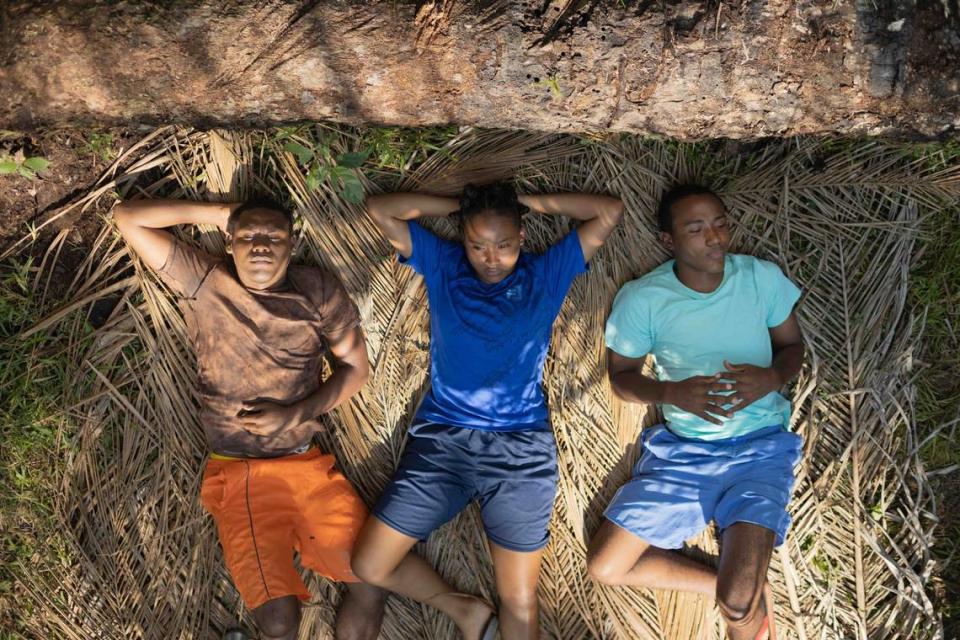
“I thought he was gonna block me. This was a whole email exchange and at first I was like I don’t want to... push the boundaries. I wanted to still be professional but I wanted him to know that we really wanted to show your film here, that it’s a whole new audience in Charlotte for your film.”
Holguin ended up contacting the Miami Film Festival, which is premiering the film in the U.S.. He convinced organizers to move up the screening date, so the Charlotte festival would be able to include it in its selections.
Producing the festival has been a lot of hard work, Torres said. But, she said, it feels good to work alongside a partner like her husband “who believes so strongly in the same things you do, who believes in you and your strengths. It feels really comforting to have him join me in this journey.”
Want to go?
The 2024 Charlotte Latino Film Festival: All films screen at the The Independent Picture House, 4237 Raleigh St, Charlotte, NC 28213. More details: charlottelatinofilmfestival.com
About the film fest
April 4: 6 p.m. – Opening night reception; 7:30 p.m. – “Empieza el baile” (“Let the Dance Begin”) Argentina. A sudden event reunites former tango stars Carlos and Margarita on a road trip in this comedy/drama.
April 5: 7 p.m. – “Allá” (“Over There”) Mexico. Oscar returns to Mexico from the U.S. for the first time and is plunged into a small community of women who have never had the Internet or a phone.
April 6: 5 p.m. – “La memoria infinita” (“The Eternal Memory”) Chile. A documentary tracing a 25 year love story between a prominent journalist, and an actress/politician coping with his Alzheimer’s diagnosis. 7:15 p.m. – “El caso Monroy” (“The Monroy Affaire”) Peru. Approaching retirement after a dissatisfying career, Ronnie Monroy finds new purpose at a women’s prison, but his motives turn out to be corrupt.
April 7: 3:30 p.m. – “La sombra del sol” (“The Shadow of the Sun”) Venezuela. A young deaf man who’s a dreamer asks his older estranged, working brother to help him compete in a musical contest; 5:30 p.m. – Pride reception; 6:30 p.m. – “Te estoy amando locamente” (“Love and Revolution”) Spain. A widow in 1970s Seville gets involved in the LGBTI+ movement to support her gay son, an aspiring singer, at a time when homosexuality is a crime.
April 11: 7 p.m. – Hecho Aquí: “Bulls and Saints” (“Toros y santos”) United States. With director Rodrigo Dorfman in attendance. This documentary, set in the rodeo rings of North Carolina, follows an undocumented family trying to return to their beloved Mexican hometown.
April 12: 7 p.m. – “La extorsión” (“The Extortion”) Argentina. An action/thriller about a retiring commercial airline pilot who is blackmailed by his country’s intelligence service to carry contraband cargo.
April 13: 4:30 p.m. – “La Suprema” Colombia. In a small, forgotten town with no electricity, a young girl rallies townsfolk to find a way to watch her estranged uncle compete in a world championship boxing match. 6:30 p.m. – “Érase una vez en el Caribe” (“Once upon a time in the Caribbean”) with actor Modesto Lacén in attendance, Puerto Rico. An action revenge tale of a peasant from a sugar plantation who will do whatever it takes to find his kidnapped wife. 9:45 p.m. – Closing Night Party with local electro-pop band Bravo Pueblo at Divine Barrel Brewing.
April 14: 11 a.m. – Cafecito con Modesto Lacén (an intimate conversation with Puerto Rican actor Modesto Lacén) at Salud Cerveceria; 3:30 p.m. – “Eduardo e Mônica” (“Eduardo and Monica”) Brazil. An unlikely love story between a high school student and a med student in this romantic comedy inspired by a 1980s rock ballad.
More arts coverage
Want to see more stories like this? Sign up here for our free “Inside Charlotte Arts” newsletter: charlotteobserver.com/newsletters#navlink=subnav. And you can join our Facebook group, “Inside Charlotte Arts,” by going here: facebook.com/groups/insidecharlottearts.


